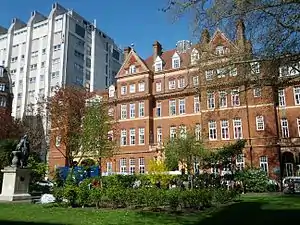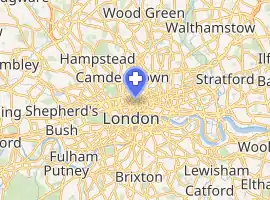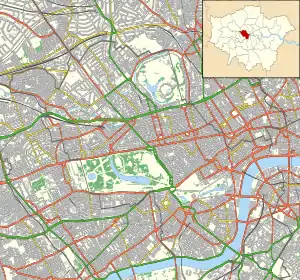National Hospital for Neurology and Neurosurgery
The National Hospital for Neurology and Neurosurgery (informally the National Hospital or Queen Square) is a neurological hospital in Queen Square, London. It is part of the University College London Hospitals NHS Foundation Trust. It was the first hospital to be established in England dedicated exclusively to treating the diseases of the nervous system. It is closely associated with University College London (UCL) and in partnership with the UCL Institute of Neurology, which occupies the same site, is a major centre for neuroscience research.[1]
| National Hospital for Neurology and Neurosurgery | |
|---|---|
| University College London Hospitals NHS Foundation Trust | |
 National Hospital for Neurology and Neurosurgery main entrance and Institute of Neurology, Queen Square, London. | |

| |
 Shown in Westminster | |
| Geography | |
| Location | London, United Kingdom |
| Organisation | |
| Care system | NHS England |
| Type | Specialist, Teaching |
| Affiliated university | University College London |
| Services | |
| Emergency department | No |
| Beds | 244 |
| History | |
| Opened | 1859 |
History
The hospital was founded by Johanna Chandler as the National Hospital for the Paralysed and Epileptic at Queen Square in 1859.[2] The hospital was completely rebuilt in the early 1880s: the East Wing was re-opened by Princess Helena in 1881 and the West Wing was re-opened by the Prince of Wales in 1885.[2] In 1904, it adopted the name National Hospital for the Relief and Cure of the Paralysed and Epileptic.[3]
The hospital served as a section of the First London General Hospital during the First World War[2] and was renamed the National Hospital, Queen Square, for the Relief and Cure of Diseases of the Nervous System including Paralysis and Epilepsy by supplementary Royal Charter in 1926.[2][4] The Queen Mary Wing was opened by Queen Mary in July 1938.[2] During the Second World War the hospital was badly damaged by German bombing.[2]
The hospital merged with the Maida Vale Hospital for Diseases of the Nervous System (founded by Julius Althaus as the London Infirmary for Epilepsy and Paralysis in 1866) in 1948, becoming the National Hospital for Nervous Diseases.[5] The current name came into use in 1990.[2] The hospital became part of University College London Hospitals NHS Foundation Trust in 1996.[2]
Services
The hospital includes 244 in-patient beds, and has nine operating theatres (including two angiography theatres). The neurology wards are named John Young and David Ferrier; the neurosurgical wards are named Victor Horsley, Bernard Sunley and Lady Ann Allerton. Nuffield ward accommodates private medical and surgical inpatients. There are neurological and neurosurgical intensive care units in the hospital. The two inpatient rehabilitation units are the Albany Rehabilitation Unit and Neurorehabilitation Unit. The main outpatient department is named in memory of Basil Samuels.[6]
See also
- List of hospitals in England
- UCL Neuroscience
- UCL Partners
References
- "Britain's best hospitals: A patients' guide". The Independent. 20 March 2008. Retrieved 18 November 2012.
- "National Hospital for Neurology and Neurosurgery". Lost Hospitals of London. Retrieved 27 June 2018.
- "The National Hospital for Neurology and Neurosurgery, London". National Archives. Retrieved 29 September 2019.
- "National Hospital for Nervous Diseases". UCL Bloomsbury Project. Retrieved 2 January 2012.
- . Dictionary of National Biography (1st supplement). London: Smith, Elder & Co. 1901.
- "National Hospital for Neurology and Neurosurgery Brochure" (PDF). University College London. Retrieved 8 April 2011.
External links
| Wikimedia Commons has media related to National Hospital for Neurology and Neurosurgery. |
- The National Hospital for Neurology and Neurosurgery
- Queen Square Archives, an extensive online collection of historical documents relating to NHNN and the Institute of Neurology
- UCL Institute of Neurology
- University College London Hospitals NHS Foundation Trust
- UCL School of Life & Medical Sciences
- University College London
- UCL Partners